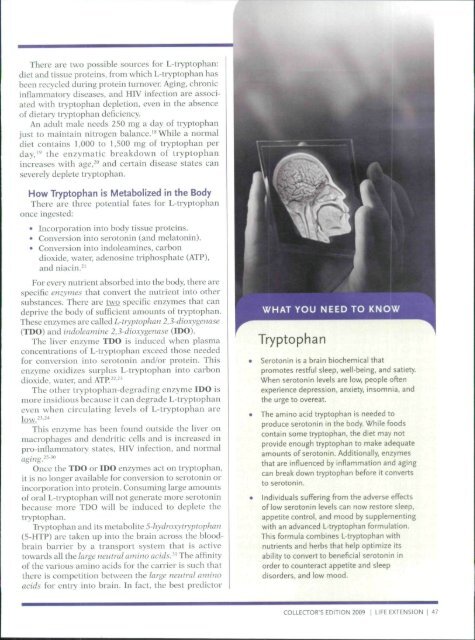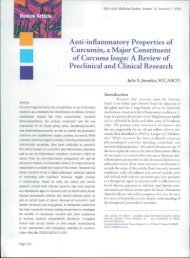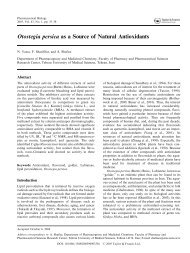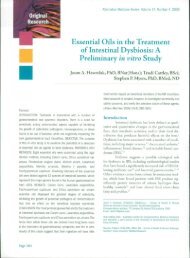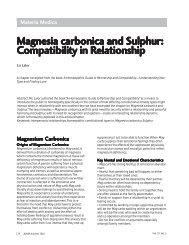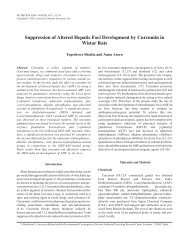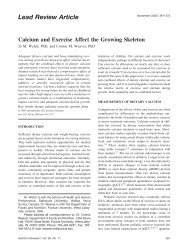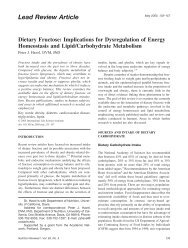Why Aging People Become DEPRESSED, FATIGUED, and ...
Why Aging People Become DEPRESSED, FATIGUED, and ...
Why Aging People Become DEPRESSED, FATIGUED, and ...
- No tags were found...
You also want an ePaper? Increase the reach of your titles
YUMPU automatically turns print PDFs into web optimized ePapers that Google loves.
There are two possible sources for L-tryptophan:<br />
diet <strong>and</strong> tissue proteins, from which L-tryptophan has<br />
been recycled during protein turnover. <strong>Aging</strong>, chronic<br />
inflammatory diseases, <strong>and</strong> HIV infection are associated<br />
with tiyptophan depletion, even in the absence<br />
of dietaiy tryptophan deficiency.<br />
An adult male needs 250 mg a day of tiyptophan<br />
just to maintain nitrogen balance."* While a normal<br />
diet contains 1,000 to 1,500 mg of ti-yptophan per<br />
day,'" the enzymatic breakdown of tryptophan<br />
increases with age,^*^ <strong>and</strong> certain disease states can<br />
severely deplete tiyptophan.<br />
How Tryptophan is Metabolized in the Body<br />
There are three potential fates for L-tryptophan<br />
once ingested:<br />
• Incorporation into body tissue proteins.<br />
• Conversion into serotonin (<strong>and</strong> melatonin).<br />
• Conversion into indoleamines, carbon<br />
dioxide, water, adenosine triphosphate (ATP),<br />
<strong>and</strong> niacin.^'<br />
For every nutrient absorbed into the body, there are<br />
specific enzymes that convert the nutrient into other<br />
substances. There are two specific enzymes that can<br />
deprive the body of sufficient amounts of tryptophan.<br />
These enzymes are called L-tryptophan 2,3-dioxygenäse<br />
(TDO) <strong>and</strong> indoleamine 2,3-dioxygenase (IDO).<br />
The liver enzyme TDO is induced when plasma<br />
concentrations of L-tryptophan exceed those needed<br />
for conversion into serotonin <strong>and</strong>/or protein. This<br />
enzyme oxidizes surplus L-tiyptophan into carbon<br />
dioxide, water, <strong>and</strong> ATP.-^"<br />
The other tryptophan-degrading enzyme IDO is<br />
more insidious because it can degrade L-tryptophan<br />
even when circulating levels of L-tryptophan are<br />
This enzyme has been found outside the liver on<br />
macrophages <strong>and</strong> dendritic cells <strong>and</strong> is increased in<br />
pro-inflammatory states, HIV infection, <strong>and</strong> normal<br />
Once the TDO or IDO enzymes act on tryptophan,<br />
it is no longer available for conversion to serotonin or<br />
incorporation into protein. Consuming large amounts<br />
of oral L-tryptophan will not generate more serotonin<br />
because more TDO will be induced to deplete the<br />
ti'yptophan.<br />
Ti-yptophan <strong>and</strong> its metabolite 5-hydroxytryptophan<br />
(5-HTP) are taken up into the brain across the bloodbrain<br />
barrier by a transpori system that is active<br />
towards all ihe large neutralamino acids.^^ The affinity<br />
of the various amino acids for the canier is such that<br />
there is competition between the large neutral amino<br />
acids for enti-v into brain. In fact, the best predictor<br />
Tryptophan<br />
Serotonin is a brain biochemical that<br />
promotes restful sleep, well-being, <strong>and</strong> satiety.<br />
When serotonin levels are low, people often<br />
experience depression, anxiety, insomnia, <strong>and</strong><br />
the urge to overeat.<br />
The amino acid tryptophan is needed to<br />
produce serotonin in the body. While foods<br />
contain some tryptophan, the diet may not<br />
provide enough tryptophan to make adequate<br />
amounts of serotonin. Additionally, enzymes<br />
that are influenced by inflammation <strong>and</strong> aging<br />
can break down tryptophan before it converts<br />
to serotonin.<br />
Individuals suffering from the adverse effects<br />
of low serotonin levels can now restore sleep,<br />
appetite control, <strong>and</strong> mood by supplementing<br />
with an advanced L-tryptophan formulation.<br />
This formula combines L-tryptophan with<br />
nutrients <strong>and</strong> herbs that help optimize its<br />
ability to convert to beneficial serotonin in<br />
order to counteract appetite <strong>and</strong> sleep<br />
disorders, <strong>and</strong> low mood.<br />
COLLECTOR'S EDITION 2009 | LIFEEXTENSION | 47


